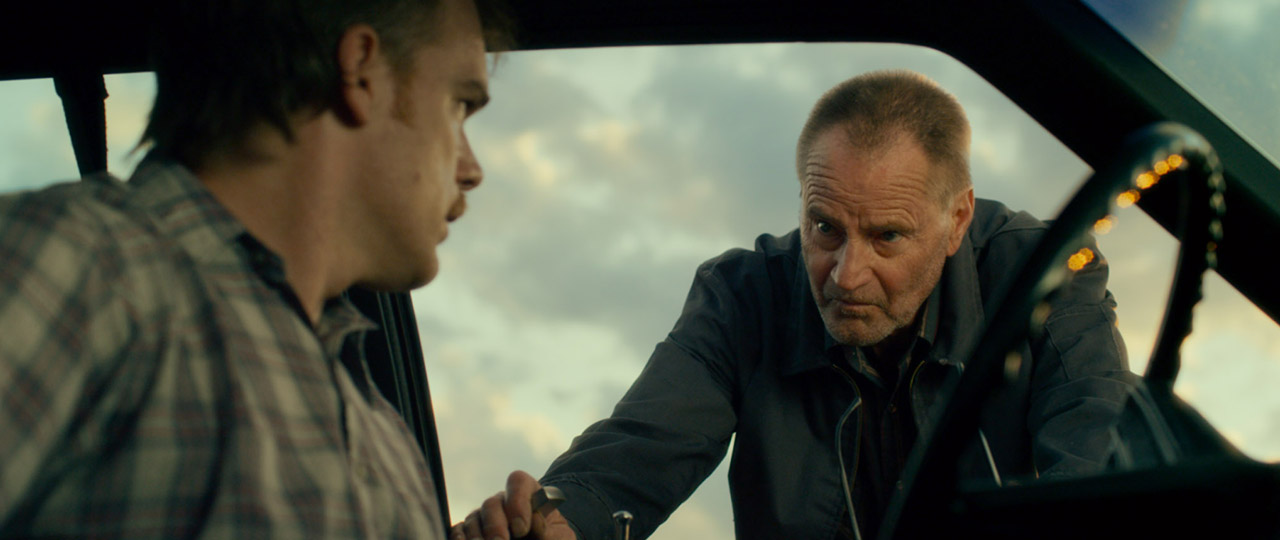The summer blockbuster season is in full swing and audiences around the country are escaping the heat and humidity to enjoy a couple hours worth of entertainment and working air condition at their local movieplex. This time of year is usually defined by big-budget spectacles featuring superheroes and giant robots, but if you look hard enough, there are tons of smaller films opening that are just as entertaining and exciting. Jim Mickle’s Cold in July is one such alternative.
A Texas thriller in the vein of Blood Simple and Killer Joe, the film opens with Richard Dane, a somewhat emasculated husband and father, accidentally shooting and killing a home intruder. Despite being played by Dexter’s Michael C. Hall, Richard is not a killer and the fatal shot was more a result of fear and nerves than good aim.
But it turns out this intruder has a father, one that’s just been released from prison and happens to look a whole lot like Sam Shepard… and he’s pissed. This puts Richard and the local authorities on edge, but for very different reasons. I won’t spoil what follows, but I will say you probably won’t see it all coming. That’s kind of what’s awesome about the film. Every thirty minutes or so, it changes gear. Every new piece of information or character development has an effect on what direction the film is going in.
First it’s an introspective rumination on violence. Then it’s a home invasion thriller. Then it’s a law enforcement conspiracy film. Then it takes a couple more turns I won’t spoil here, before leading us into a final shootout that simultaneously evokes both Taxi Driver and Django Unchained.
To some, this will be maddening. We’ve been indoctrinated by three act structures and genre expectations so much that when we see a film that dares to color outside the lines our first reaction is to say it’s poor filmmaking and doesn’t work. But I kind of dug it. It’s rare to see a film made today that is truly unpredictable. Rules of storytelling and filmmaking are important and have their purpose, but sometimes it’s worthwhile to ask, “Why not?”
That being said, I don’t know if all the twists and turns necessarily work. There are a few loose ends I would’ve liked to have seen addressed, as the film seems to go for a more thematic and character driven finale than one that’s necessarily dictated by the plot. But you got to give them credit for trying, because when this film works, it really works, and I think that’s a testament to Jim Mickle’s direction.
The film has a tremendous amount of style to it. The book on which the film is based was published in 1989, so instead of updating the setting to modern times, Mickle decides to have fun with the 80’s aesthetic, both in terms of the look of the film and the way it’s shot. If you’re familiar with 80’s thrillers you know what I mean: neon lights, slow motion, and a synth soundtrack.
Speaking of which, let’s talk about that soundtrack. Jeff Grace’s score is one of the year’s best. A couple days after seeing the film and the tracks are still going through my head. It evokes the best 80’s style film music without being goofy or entering into parody. It’s bound to sit on the shelf or be featured on a playlist along with the soundtrack toDrive and the scores of John Carpenter and Tangerine Dream.
Mickle really anchors the film in his three leads. Richard is featured in nearly every scene and gives Michael C. Hall a unique challenge: to not change. I mean, I’m sure Richard changes in a couple small ways here and there, but I’m talking the big expected arc usually associated with this type of character. He’s not a weakling that learns to be a badass. In fact, Richard’s one badass moment in the finale is immediately followed by him being put down by one of the bad guys. He’s just not a tough guy. But he is a man who knows he has to protect his family, even if he’s not the best at doing so.
So it would make sense that he eventually gets paired up with two characters who actually know how to handle themselves. Sam Shepard as the criminal father is the cold and stoic Clint Eastwood type mixed with Robert Mitchum’s performance in Night of the Hunter. There are moments when he can be genuinely frightening and fiercely intimidating, and then others when you can see real emotion and hurt inside him. Then there’s Don Johnson as Jim Bob, a private detective that enters halfway through and gives the film its second wind. I’m sure there’s a version of this story that works without the character, but it’d be way less entertaining. Both Shepard and Johnson have used their advancing age to transition into character actors, but it’s nice to see them once again take on leading roles.
Cold in July premiered at the 2014 Sundance Film Festival back in January and is now rolling out in a limited theatrical release as well as Video on Demand. So if you can find a theater that’s showing it or got $5 to spare, I suggest you check it out. If you like a good paperback thriller or 80’s throwback, you’ll like this. If you’re still on the fence, check out the trailer:




